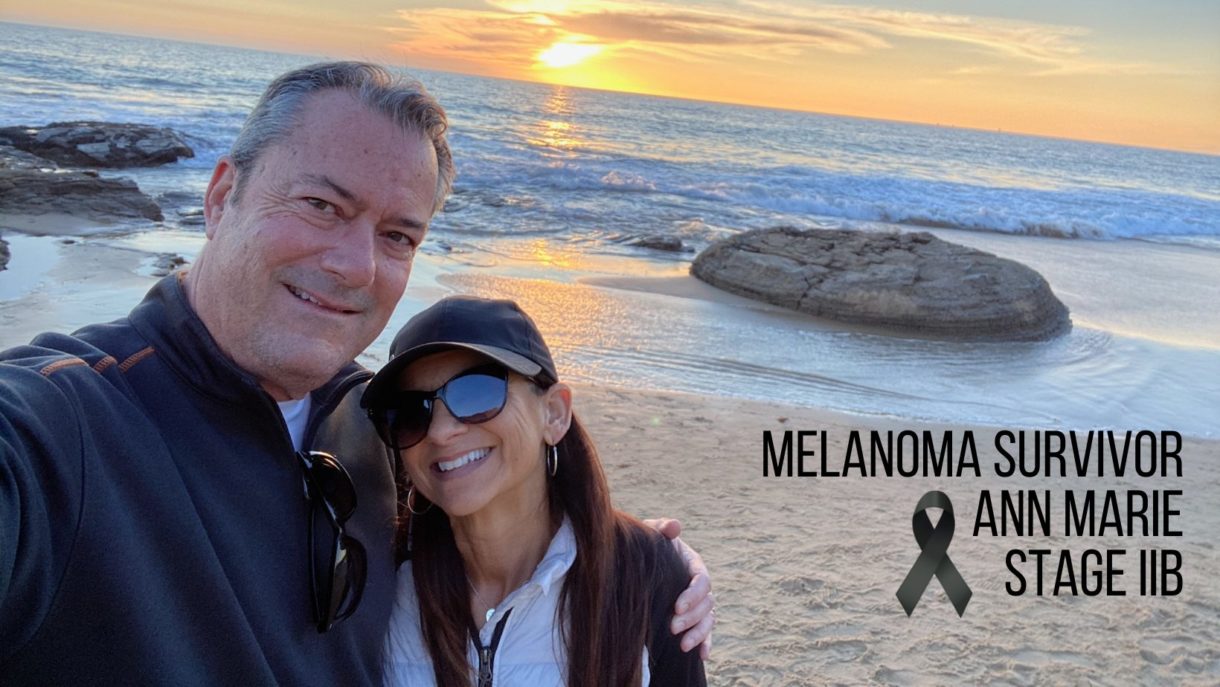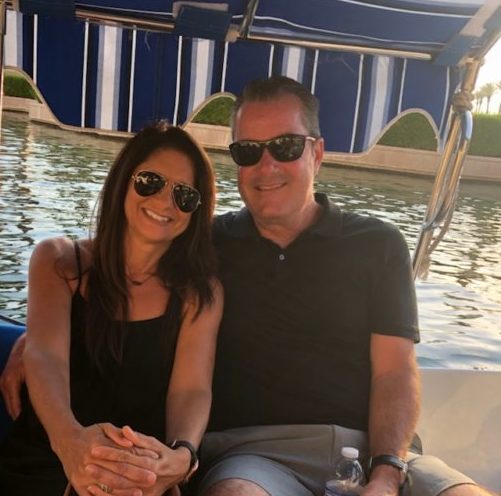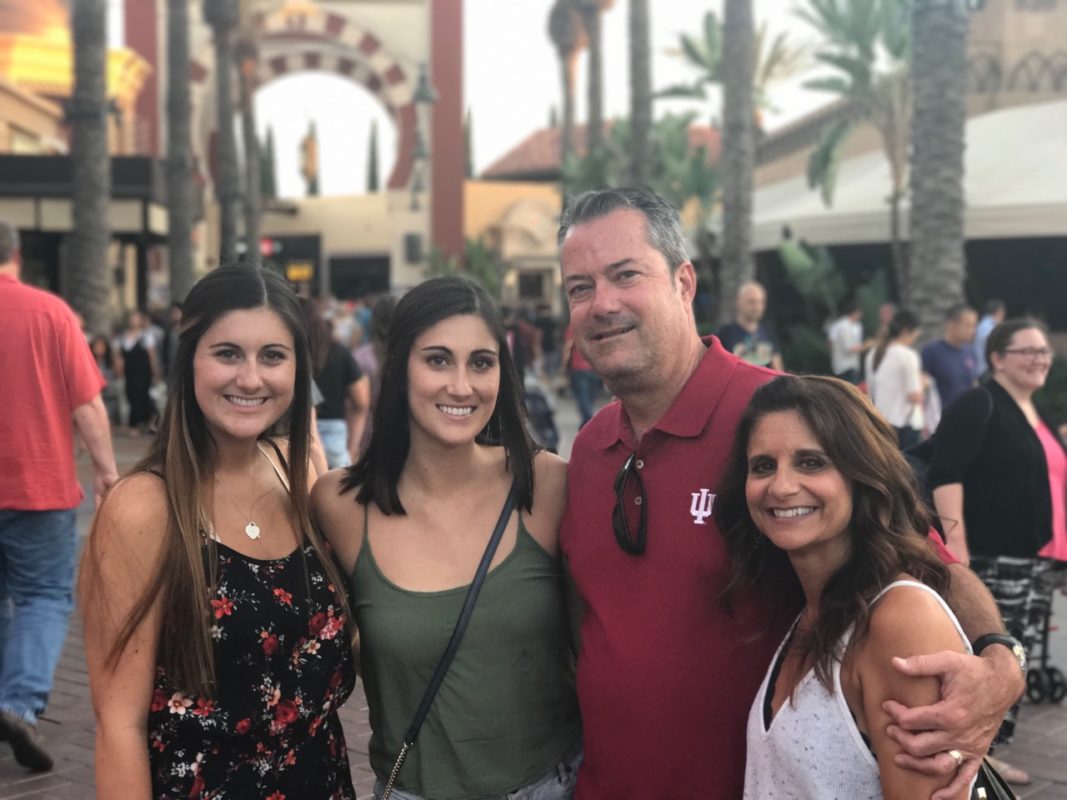Featured Survivor Story:
One Survivor Finds Empowerment through Education and Supporting Others

By Mara Klecker
Ann Marie received her first-ever physical in 2019 at the age of 53. She’d lost her father to Alzheimer’s and her 59-year-old sister to non-small cell lung cancer earlier that year and decided she should pay attention to her own health.
At the end of her inaugural physical, the doctor asked Ann Marie if there was anything else she was worried about. That’s when she asked the doctor to look at a large mole on her buttocks. She was hardly worried about it – it’d been there since at least 1995, Ann Marie knew, because she remembered the delivery nurse asking about it when she was giving birth to her first daughter. Shortly after giving birth, Ann Marie had the spot biopsied and found out it was benign. But it was large and raised enough to show when she wore a swimming suit or even tight workout leggings, so she was hoping it could be removed.
Once the spot was removed, Ann Marie was ready to forget about it. But then her doctor called.
Ann Marie was just a few minutes away from leaving for the airport to visit her daughter in Utah when the call came in. The doctor said the mole was not benign and was, in fact, melanoma.
“She told me not to Google it,” she said. “That raised all the red flags.”
 But Ann Marie was determined to not worry or overburden her family, especially during the visit with her daughter.
But Ann Marie was determined to not worry or overburden her family, especially during the visit with her daughter.
“I just kind of tried to put it out of my mind for a bit,” she said.
She did, however, send her lab results to a friend, who stayed on the phone with her and started making recommendations of surgeons and treatments to look into.
“Basically, from that point, everything happened to me,” Ann Marie said. “I felt like I didn’t have any control.”
In those first few appointments with oncologists, Ann Marie was in a fog. She couldn’t focus and was too shaken to start researching or advocating for herself.
“I was so disappointed in myself,” she said. “I always pictured myself being empowered during a trial like that. I thought I’d take charge, but I just wilted.”
That feeling is the reason Ann Marie jumped at the chance to be a mentor with AIM at Melanoma’s Peer Connect program. She didn’t want others to feel as lost and as lonely as she did in the days after her diagnosis.
“I had this incredible support network of friends and family around me, but all I wanted to do was talk to other people who had been through what I was going through,” she said.
Ann Marie was diagnosed with Stage IIB melanoma and underwent surgery to remove the tumor and then a yearlong, double-blind clinical trial of pembrolizumab (Keytruda), which has since been FDA approved for treating Stage IIB and IIC melanoma. She’s been NED for about two years, but she still attends all of AIM’s webinars to find out about new research and treatments.
That’s how she empowers herself in the ways she wishes she could have in those first few days after her diagnosis.
“Even though I’m two years out and NED, melanoma is something I think about every day,” she said.
“Actively staying involved in the solutions (like the clinical trial and keeping up on the webinars) is about being armed. It makes me feel like if this comes back, I’m going to have the best shot at surviving it because I’ve been educating myself.”
 Those lessons about education and empowerment are ones she hopes to pass on to the mentees she is paired with through the Peer Connect program. Both of the women she’s mentoring faced similar diagnoses to hers and were struggling with some of the same fears and anxieties she went through.
Those lessons about education and empowerment are ones she hopes to pass on to the mentees she is paired with through the Peer Connect program. Both of the women she’s mentoring faced similar diagnoses to hers and were struggling with some of the same fears and anxieties she went through.
“I got so much stronger when I found hope,” Ann Marie said. “So that’s what I feel I can help provide to others. You don’t even know how comforting it is to have somebody say, ‘I’ve been there, I know what that feels like.’ It’s amazing to be able to give that to someone who needs to hear that.”
Recent Posts

The Cost of Sunscreen May Be Costing Lives

A Conversation with Dr. Rena Szabo, PsyD on Empowering Patients

Empowering Women in Melanoma: A Look Inside the Women in Melanoma Initiative

Melanoma News and Highlights You Don’t Want to Miss


